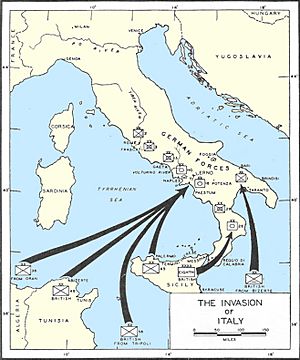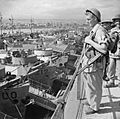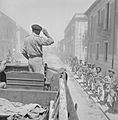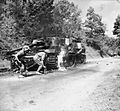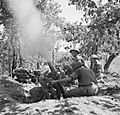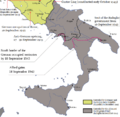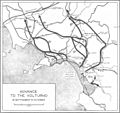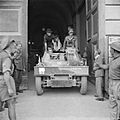Allied invasion of Italy facts for kids
Quick facts for kids Invasion of Italy |
|||||||
|---|---|---|---|---|---|---|---|
| Part of the Italian Campaign of World War II | |||||||
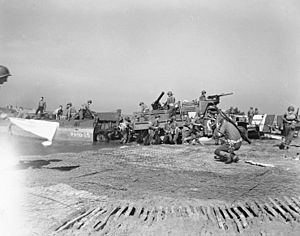 Troops and vehicles being landed under shell fire during the invasion of mainland Italy at Salerno, September 1943. |
|||||||
|
|||||||
| Belligerents | |||||||
(to 8 September) |
|||||||
| Commanders and leaders | |||||||
| Strength | |||||||
| 189,000 (by September 16) | 100,000 | ||||||
| Casualties and losses | |||||||
| 2,009 killed 7,050 wounded 3,501 missing |
3,500 casualties | ||||||
The Allied invasion of Italy was a big military attack. It happened during World War II. Allied forces landed on the mainland of Italy. This invasion began on September 3, 1943.
It came right after the Allies successfully took Sicily. This whole effort was part of the larger Italian Campaign.
The invasion was led by General Harold Alexander. His 15th Army Group included two main armies. One was the U.S. Fifth Army. It was led by Lieutenant General Mark Clark. The other was the British Eighth Army. This army was led by General Bernard Montgomery.
The main landing happened near Salerno. This was on Italy's western coast. This part of the plan was called Operation Avalanche. Two other attacks also took place. One was in Calabria (called Operation Baytown). The other was in Taranto (called Operation Slapstick).
Contents
Planning the Invasion of Italy
After the Axis Powers lost in North Africa, the Allies had to decide what to do next. Winston Churchill, the British Prime Minister, really wanted to invade Italy.
They soon realized they couldn't invade Italy in 1943. So, they decided to invade Sicily first. The Allied invasion of Sicily in July 1943 was a success. However, many Axis soldiers escaped to mainland Italy. Also, Benito Mussolini was removed as Italy's leader.
Operation Baytown was the plan for the British Eighth Army. They would land near the tip of Calabria. This landing was set for September 3, 1943. The Allies also sent paratroopers to airfields near Rome.
The main landings were called Operation Avalanche. They were planned for September 9. The U.S. Fifth Army would land near Salerno. The German commander, Albert Kesselring, knew he couldn't stop this landing.
The Battle for Italy Begins
On September 3, 1943, the British Eighth Army started Operation Baytown. Their XIII Corps led the attack. Italian troops quickly surrendered. By September 4, the 5th Division reached Bagnara.
The Eighth Army moved slowly. Blown-up bridges, roadblocks, and mines caused delays. Meanwhile, German General Heinrich von Vietinghoff got his 10th Army ready. They planned to attack the Allied landings.
On September 8, something big happened. Italy announced its surrender to the Allies. This was before the main invasion. Italian soldiers stopped fighting. The Italian Navy sailed to Allied ports to surrender. German forces in Italy quickly took over important defensive spots. Operation Slapstick began on September 9.
Operation Avalanche at Salerno
Operation Avalanche was the main invasion. The U.S. 5th Army landed at Salerno. This started on September 9, 1943. Major General Rudolf Sieckenius led the German 16th Panzer Division. He had divided his forces into four groups.
By the end of the first day, the 5th Army had made a good start. Two divisions of the X Corps moved inland. They advanced about 5 to 7 miles (8 to 11 km).
For the next three days, the Allies fought hard. They wanted to gain more beach territory. The Germans defended strongly. By September 12, the X Corps took a defensive position. On September 13, the Germans launched their own attack. German battle groups attacked the northern part of the beach. The main attack was between the two Allied Corps.
On September 15, the 16th Panzer Division and 29th Panzergrenadier Division took up defensive positions. Kesselring said the attack by XIV Panzer Corps had to succeed. If it failed, the Tenth Army would have to retreat.
On September 14, the Allies started to advance again. By September 16, the 5th Infantry Division reached Sapri. The Germans then decided to pull out of the battle. They withdrew on September 18 and 19.
Salerno Mutiny
The Salerno battle also saw something unusual. It was called the Salerno Mutiny. About 500 men from the British X Corps refused to join new units. The corps commander, McCreery, convinced about half of them to follow orders. The rest faced a court-martial.
With the Salerno beachhead secure, the Fifth Army began its attack. They moved northwest towards Naples. This advance started on September 19.
Images for kids
-
Men of the 2nd Battalion, Northamptonshire Regiment, part of 17th Brigade of British 5th Division, wait to board landing craft at Catania for the invasion of Italy, 2 September 1943.
-
Lieutenant General Mark Clark on board USS Ancon during the landings at Salerno, Italy, 12 September 1943.
-
U.S. Navy tank landing craft offloads a U.S. Army jeep at Salerno.
-
Men of the 2/6th Battalion, Queen's Royal Regiment (West Surrey) advance past a pair of burning German PzKpfw IV tanks in the Salerno area, 22 September 1943.
-
Generalfeldmarschall Albert Kesselring, Commander of the German forces in Italy.
-
Daimler scout car of the 1st King's Dragoon Guards at the town hall in Naples, 1 October 1943.
 | William Lucy |
 | Charles Hayes |
 | Cleveland Robinson |


